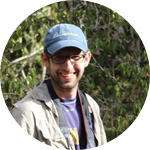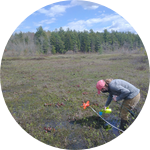About This Project
25% of peatlands, which are essential to global hydrology and carbon storage, are degraded. Bees, our foremost pollinators, are also declining. Though peatlands host many threatened invertebrates, and wetlands are among the most important habitats for specialist bees, there remains a lack of knowledge on peatlands bees. We will investigate the relationship between peatlands and bees to create management recommendations for their conservation.
Ask the Scientists
Join The DiscussionWhat is the context of this research?
Peatlands are important due to their role in global climate systems and as habitat for rare species. They are particularly vulnerable to the projected changes in temperature and nitrogen cycling associated with climate change, disturbance, and habitat fragmentation, necessitating continued study of these fragile ecosystems. Though peatlands host many threatened invertebrates, the last known study of peatland bees was conducted in Canada in 1994. Recent bee studies have also revealed that many vulnerable pollen specialist ("nongeneralist") bees specialize on wetland plants. Thus, an understanding of the bees and plants present in unique peatland habitats is essential to inform the conservation of both bees and peatlands.
What is the significance of this project?
Plant-pollinator relationships are some of the most ecologically and economically important interactions on Earth. Bees are not only the most effective pollinators and keystone species in most environments in North America, but they also act as valuable indicators of ecosystem health. One of the only known peatland invertebrate studies to focus on bees was conducted almost 30 years ago, but they were unable to achieve species-level identification. Additionally, most studies conducted on northeastern bees have been in habitat types other than wetlands and peatlands with the few exceptions to this rule focusing on cranberry bogs. Fundamental knowledge of peatland bee assemblages is essential to inform effective conservation practices.
What are the goals of the project?
The objectives of this study are to establish baselines of bee population diversity and abundance in New Hampshire peatlands and to explore the floral community characteristics associated with bee diversity and abundance in different peatlands. We will also investigate the potential influence of peatland distance to forest edge on bee community composition and then generate recommendations for wild bee conservation and habitat management in peatland ecosystems.
Budget
As many of the field sites are remote and do not have cell service, working alone and in the unstable, knee-to waist-deep water in peatlands can be a safety issue. Being able to pay a field assistant to join me would greatly alleviate some of these safety concerns.
The purpose of these funds is to be able to provide a travel stipend for a field assistant. Our 10 sites are located across the state of New Hampshire and will require 4 visits each throughout the field season. Average roundtrip mileage (farthest site vs. closest site) from where my assistant lives to our field sites is 101.6 miles. (101.6 miles x 4 site visits x 10 sites)x 2021 federal mileage rate of $0.56/mile= $2275.84. I am hoping to raise at least $1600. Any additional funds raised over $2275 will go to mileage costs for myself, additional supplies needed, or other expenses like costs for registration to present this research at scientific conferences.
Endorsed by
 Project Timeline
Project Timeline
Between May and September 2022, I will conduct field surveys at ten New Hampshire peatland sites. Each site will be sampled three times throughout the season using both pan trapping and hand netting. We anticipate collecting ~1500 total bees which will then be washed, dried, pinned, and identified to species. Bee data and all relevant site and vegetation data will then be analyzed and used to inform management recommendations.
Apr 05, 2022
Project Launched
Oct 31, 2022
Complete all fieldwork and field data collection
Jan 31, 2023
Complete washing, drying, pinning, and identification of bees
Feb 28, 2023
Data analysis
May 15, 2023
Share results as written reports and presentations with specific sites and project supporters
Meet the Team
Alaina Bandanza
My name is Alaina Bandanza. I am a second-year Conservation Biology Master’s candidate. From a young age, my favorite activity was playing in my backyard– bringing in any bugs found along the way for observation. For undergrad, I attended Agnes Scott College where I majored in Biology with a minor in Environmental and Sustainability Studies. At ASC I volunteered with the college’s Center for Sustainability, spent my weekends volunteering with our service club, tutored Biology, worked as a peer advisor to incoming freshmen, led the Bee Society, and had the opportunity to intern with Atlanta Audubon (now Georgia Audubon).
Feeling a calling back to cooler New England weather, I applied to Antioch for my Master’s. Last summer I completed my first field season and the pilot study for this project.
After graduation, I aspire to continue my work in pollinator conservation. I dream of a career either working with landowners to best monitor, manage and develop their properties to benefit bees and other pollinators, or a career in advocacy communicating the most impactful findings of current pollinator research to stakeholders to generate sustainable change and protection for our vitally important pollinators.
Project Backers
- 39Backers
- 218%Funded
- $3,490Total Donations
- $89.49Average Donation

